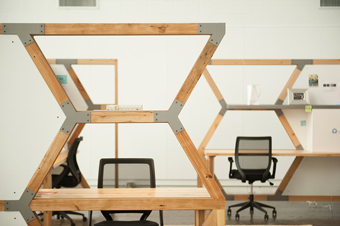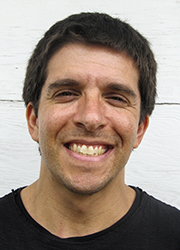abeo turns reclaimed materials into distinctive workstations
 Abeo Design
Abeo Design
Daniel Cuffaro has been working in design for 20 years. He knows how an inspiring, eclectic workspace can act as fuel for creative minds, promoting interaction among those who essentially use their imagination for a living.
Such was the idea behind Cuffaro's founding of Abeo Design, a Lakewood-based company that builds aesthetically distinctive office/studio workstations with a sustainable bent. Unlike your typical office furniture, the spindly "Hive" workstations are designed with both functionality and adaptability in mind, Cuffaro says.
Each station is comprised of a work surface and storage shelf embedded with LED lighting. The entire unit is on wheels, making a studio or office easy to reconfigure as projects or teams change, notes Cuffaro. This is not something you could readily do with a set of hard-to-move cubicles.
"Our product is a dynamic and customizable alternative,” he says.
The workstations also fulfill a practical need. They are made of wood and other building materials reclaimed from abandoned Cleveland houses deconstructed during the foreclosure crisis. Cuffaro, head of the industrial design program at The Cleveland Institute of Art (CIA), first got the idea for Abeo in 2009 when he was developing the layout for the school's design studio. At the time, there was a growing market for raw materials harvested from foreclosed homes, so why not build CIA's studio furniture with those resources?
"I had a desire to turn a bad situation into something salvageable," Cuffaro says.
His first customer also happens to be his current employer. CIA recently purchased a handful of the $6,000-and-up workstations from Abeo, which works with Northeast Ohio companies A Piece of Cleveland and Benchmark Craftsmen to make the product a reality.
A portion of Abeo's profits will support CIA programs. Meanwhile, Cuffaro will continue to live by the company's name. In Latin, Abeo ( pronounced "a-bay-o") means "change" or "transformation." Turning trash into something of value is good for both the company and a sustainable Cleveland, he says.
SOURCE: Daniel Cuffaro
WRITER: Douglas J. Guth

